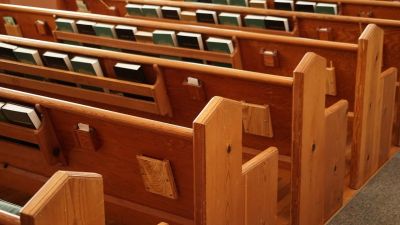ninja007
Gold Member
The False Hope of Purgatory
by John MacArthur
Wednesday, July 13, 2022
This post was originally published in July 2018. –ed.
Let’s be clear from the outset: The Roman Catholic doctrine of purgatory is taught nowhere in Scripture. It was invented to accommodate Catholicism’s denial of justification by faith alone. And it offers false hope to millions who anticipate ample time beyond the grave—perhaps eons, if necessary—to achieve their own justification.
Scripture very clearly teaches that an absolutely perfect righteousness is necessary for entry into heaven. Jesus said, “I say to you that unless your righteousness surpasses that of the scribes and Pharisees, you will not enter the kingdom of heaven” (Matthew 5:20). He then added, “Therefore you are to be perfect, as your heavenly Father is perfect” (Matthew 5:48)—thus setting the standard as high as it can possibly be set.
The Only Way to Heaven
Later in His ministry, when the rich young ruler approached Jesus to ask how he might enter heaven, Jesus upheld this same standard of absolute perfection. He began by challenging the clear implication that the young man hoped he could attain a sufficient goodness of his own to merit heaven: “Why are you asking Me about what is good? There is only One who is good” (Matthew 19:17). Notice: Jesus did not disclaim that He Himself was sinlessly perfect (a common misinterpretation of this passage). He was simply pointing out plainly that the standard of perfection required to earn heaven is impossible for fallen creatures.
Because the young man was undeterred by this, however, Jesus told him that to obtain eternal life, he must have a track record of perfect obedience to the law (Matthew 19:17-22). Again and again, Jesus made the required standard of righteousness impossibly high for all who would seek to earn God’s favor on their own.
The young ruler clearly did not understand or acknowledge his own sinfulness. He assured Jesus that he had indeed kept the law from his youth up (v. 20).
Jesus subtly pointed out the young man’s covetousness (v. 21), which was a violation of the tenth commandment. From the outset of His conversation with the young man, the Lord was prodding him to confess that no one but God Himself is truly good. But the rich young ruler was unwilling to face his own sinfulness, and so he went away without salvation.
The disciples marveled at this. The young man was evidently—from a human perspective—one of the most righteous individuals they’d encountered. Notice that no one disputed his claim that he had obeyed the law. That suggests there were no overt sins in his life that anyone could point to. He seemed the best of men. So the disciples were floored when he walked away with no assurance of eternal life from Jesus. In fact, Jesus told them, “Truly I say to you, it is hard for a rich man to enter the kingdom of heaven. Again I say to you, it is easier for a camel to go through the eye of a needle, than for a rich man to enter the kingdom of God” (Matthew 19:23-24).
There’s no mistaking Jesus’ point. He was setting the standard at an impossible height. He was saying that the most fastidious legal observance is not enough. The most flawless external righteousness is not enough. All the worldly advantages of wealth are of no help. Only absolute perfection is acceptable to God. Our Lord kept underscoring these truths because He wanted people to see the utter futility of trying to earn righteousness by any system of works.
The disciples got the message. They asked, “Then who can be saved?” (Matthew 19:25).
And Jesus replied, “With people this is impossible, but with God all things are possible” (Matthew 19:26).
Accepted By Imputation
We know from Paul’s treatise on justification in Romans 4 that God saves believers by imputing to them the merit of Christ’s perfect righteousness—by no means because of their own righteousness. God accepts believers “in Christ.” He clothes them with the perfect righteousness of Christ. He declares them perfectly righteous because of Christ. Their sins have been imputed to Christ, who has paid the full penalty. His righteousness is now imputed to them and—through His imputed righteousness—they receive His full merit. That is what justification by faith means. The Father “made Him who knew no sin to be sin on our behalf, so that we might become the righteousness of God in Him” (2 Corinthians 5:21).
In other words, God does not first make us perfect, then accept us on that basis. He first legally justifies us by imputing to us an alien righteousness, then perfects us by conforming us to the image of Christ. He “justifies the ungodly” (Romans 4:5).
Paul wrote, “Therefore, having been justified by faith, we have peace with God through our Lord Jesus Christ” (Romans 5:1). “Therefore there is now no condemnation for those who are in Christ Jesus” (Romans 8:1). Those verses describe our justification as something already accomplished—a completed reality, not something we are striving for. Jesus Himself described justification as an immediate event when He told how the repentant publican was saved after begging God for mercy: “I tell you, this man went to his house justified” (Luke 18:14).
Scripture clearly and consistently attests to justification as a settled fact for every believer; it is not an ongoing process. We stand before God in faith right now, fully acceptable to Him because of Christ’s righteousness—not because of any doings of our own.
False Doctrine and False Hope
Roman Catholic doctrine denies all of that. Catholicism teaches that justification is an ongoing process that depends on the degree of real, personal righteousness we achieve. According to Rome, Christ’s merit imputed to us is not enough to save; we must earn more merit of our own through the sacraments and other good works. Righteousness is infused into us (rather than being imputed to us). But it is obvious that we are not perfectly righteous by any practical measure. So the righteousness we obtain by grace must be perfected by our own efforts.
According to Catholic teaching, this real, personal righteousness that resides in us is the necessary ground on which God accepts us. And our justification is not complete until we are really and completely perfect—by an inherent righteousness, not merely by a legally imputed righteousness. This actually reverses the biblical order, suggesting that we must first be perfected, and only then is our justification complete. In other words, in Roman Catholic doctrine, God does not justify the ungodly.
The Catholic view of justification poses an obvious dilemma. We know too well that even the best Christians fall far short of perfection. No one (Catholic teaching actually says almost no one) achieves absolute perfection in this life. And if our own perfection is a prerequisite for heaven, it would seem no one could enter there immediately upon dying. Any remaining imperfections would need to be worked out first.
The invention of purgatory was necessary to solve this dilemma. Deny that we are justified by faith alone, and you must devise an explanation of how we can make the transition from our imperfect state in this life to the perfect state of heaven. Purgatory is where Roman Catholics believe most people go after death to be finally purged of their remaining guilt and gain whatever merit they may be lacking to enter heaven. Catholicism teaches that this process involves intense pain and suffering.
Oddly enough, although Catholic doctrine denies that the imputed righteousness of Christ is sufficient to save sinners in this life, it does allow the imputation of righteousness from living sinners to those in purgatory. This is why masses are said for the dead. Supposedly the righteousness earned by way of the sacrament is imputed to the person in purgatory, which shortens his or her stay there.
The Catholic doctrine of purgatory offers false hope to people hoping to atone for their own sins on the other side of the grave. Rome’s warped and perverted view of justification will undoubtedly usher into eternal torment many who expected to have more time to achieve perfection.



